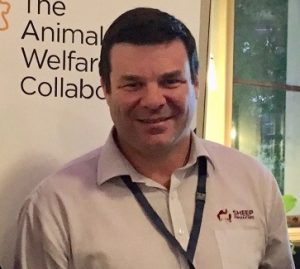
Sheep Producers Australia CEO Stephen Crisp
AUSTRALIA should be ambitious in seeking to increase its United Kingdom and European Union sheep meat market access but not imply that export volumes would immediately increase, Sheep Producers Australia chief executive officer Stephen Crisp said this week.
Mr Crisp said Australia is in a good position to increase sheep meat market access in the United Kingdom and the European Union, due to New Zealand’s tight lamb supply and the importance of post COVID-19 trade recovery to all economies.
SPA said Australian sheep and lamb products are currently sent to a diverse range of countries; however, exports to the UK and Europe have been very limited, and BREXIT has thrown even more difficulties into the mix.
“Our (EU) quota in comparison to other countries is very low, so the only acceptable outcome for the countries (the EU and UK) is for us to have much greater access,” Mr Crisp said.
Sheep Producers Australia this week welcomed the announcement by Australian Trade Minister Simon Birmingham that negotiations will commence to further the United Kingdom (UK) Free Trade Agreement.
SPA said the UK will be having the same negotiations with New Zealand, which is currently the largest exporter of lamb. NZ also has a tight supply situation, but has previously had much more favourable access than Australia in the UK and EU markets.
A Meat & Livestock Australia market snapshot last year said the EU is negotiating FTAs with Australia and New Zealand in parallel and that transformation of the EU’s restrictive import quotas will be a necessary component of ongoing negotiations.
Australia has a 19,186 tonne (combined sheep and goat meat) country-specific import quota into the EU with 0 percent in-quota duty. However, out of quota imports from Australia incur prohibitive import duties of 12.8pc, plus up to an additional €3.1/kg.
Australian sheep meat is currently disadvantaged compared to New Zealand, which has a 228,254 tonnes quota – more than 11 times larger than Australia’s. However, New Zealand’s quota has not been fully utilised in recent years, MLA said.
“Now is a very good time to demonstrate that supply options from Australia will be of great benefit to the UK and Australia,” Mr Crisp said.
He believed Australia needed to be ambitious and aim to increase its EU quota.
“Our objective should be ambitious, but it is more in terms of making sure that the Europeans and the UK have options, and our exporters have options to supply these very large markets.
“But we don’t want to give the impression that we are immediately going to switch our production systems and send large volumes to these countries,” he said.
“But if there is continuing demand then we’ve got to have the options to switch our production methods and both benefit by sending more product there when it’s needed.”
“SPA appreciates the efforts of the Federal Government in order to move forward whilst both countries are still dealing with pandemic issues.
“The current situation with COVID-19 only reinforces the importance of these talks to both countries,” says Mr Crisp.
Mr Crisp said every country was in a “flat spot” economically due to the pandemic.
“And trade only improves that, so every country should be looking at how to expand their trade relationships because it is going the fastest way out of this slump that we are all in.”
“I think it is as good a time as any for the UK and the EU to explore their options in sourcing sheep meat.”
Mr Crisp said while Australia has historically low sheep numbers, the FTA negotiations were all about opening up options for the Australian producers as well as for the UK consumer and will be of mutual benefit.
EU sheep meat production stabilised
The MLA snapshot said after declining 25 percent over the ten years to 2014, EU sheep meat production has since stabilised and is forecast to increase only modestly, if at all, over the next decade.
The UK is the powerhouse of EU sheep meat production, accounting for one third of supply, followed by Spain and France. Imports have accounted for 20pc of EU sheep meat consumption over the last decade, and Australia and New Zealand have remained the only significant external suppliers, MLA said.
MLA said New Zealand’s preferential trading has allowed it to capture the majority of EU/UK import market share. New Zealand also produces a lighter carcase than Australia, resulting in cut sizes more in line with local product, providing an advantage into the imported UK leg roast market.
However, MLA said EU imports from New Zealand over the last five years have been stretched by supply constraints as land is increasingly reallocated to the dairy sector and China emerges as a major buyer of imported NZ sheep meat.

And we need to be alert to British competition in the Chinese markets for our sheep meat products. As Boris Johnson told a meeting of Welsh sheep farmers recently, “Wales is closer to China than New Zealand.” British farmers should be freed from the anti-competitive behaviour of Brussels, and if they are game enough, their system of farm subsidies has enormous agricultural production potential. In fact, they are no slouches today.